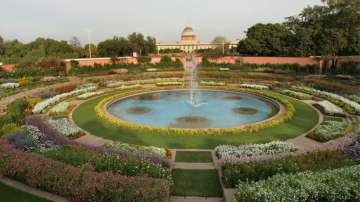Long rows of dark pink "Modern Art" roses juxtaposed with white, full-bodied "Ice Berg", patches of daisies, tulips and lilies mark the onset of the spring ahead of the annual "Udyanotsav" at the historical Mughal Gardens. The iconic garden at the heart of the President's Estate will be opened to public from February 5, Superintendent, President's Gardens, P N Joshi announced on Sunday. Over 10,000 Tulip bulbs, 138 types of roses and 70 different kinds of about 5,000 seasonal flowers will welcome the visitors to the garden.
Known for its exotic and rare rose varieties, the garden this year boasts of "Grace de Monaco" rose, which was planted by Prince Albert II of Monaco last year.Part of the fragrant exhibit are variety of roses named after eminent people, including former president Pranab Mukherjee, Mother Teresa, former US president John F Kennedy, Queen Elizabeth and first Indian prime minister Jawaharlal Nehru. Apart from the roses commemorating renowned personalities, there will be roses with unconventional names as "Christian Dior", "American Heritage", "First Prize", "Kiss of Fire" and "Double Delight".
The visitors can also see some of the very rare types of roses such as "Green Rose" with thin and long green petals, "Oklahoma" and "Bonne Nuit" with their almost black texture, and "Blue Moon" and "Lady X" with a definite blue hue to them. The garden is also covered by a variety of bulbous flowers like "Narcissus", "Dahlia", "Sparaxis", "Ranunculus", "Hyacianth" and "Asiatic Lily".
The teacup-shaped Tulips are another attraction at the Mughal Gardens, especially "Jammu Pink" Tulip, which stands low yet distinguished with its rich pink petals edged with white, giving it a shiny texture. The Mughal Gardens saw 5.18 lakh visitors last year and has received 3-6 lakh visitors every year since 2003.
"The large number of visitors also pose so me issues when they don't adhere to guidance and let their children pluck flowers or create disturbance for others," Joshi told PTI.
"There will be security, barricades where necessary and our garden staff will keep an eye on anyone ruining the plants. It's a difficult task to maintain the garden if we don't take care, it takes a long time to bring it to its original shape," he added.
Inspired by the Mughal Gardens of Jammu and Kashmir, the garden around the Taj Mahal as well as Persian and Indian miniature paintings, the Mughal Gardens was designed by Edwin Lutyens and includes many elements of British garden art.
Covered by "doob" grass, which was originally brought from the Belvedere Estate, Kolkata, the lawn is abundantly covered by shade of neatly trimmed trees like Moulsari, Cypress and China Orange.
The visitors will be able to access all three parts of the garden - rectangular, long and circular - apart from the spiritual garden, herbal garden and bonsai garden.
On their visit to the Mughal Gardens, people can also view the Rashtrapati Bhavan Museum, which houses archival photos and drawings of the garden.
The gardens will remain open from 10 am to 4 pm throughout the week, except on Mondays, till March 8. However, the garden will open exclusively for farmers, differently-abled persons, defence, para-military forces, and Delhi police personnel.
Latest India News
